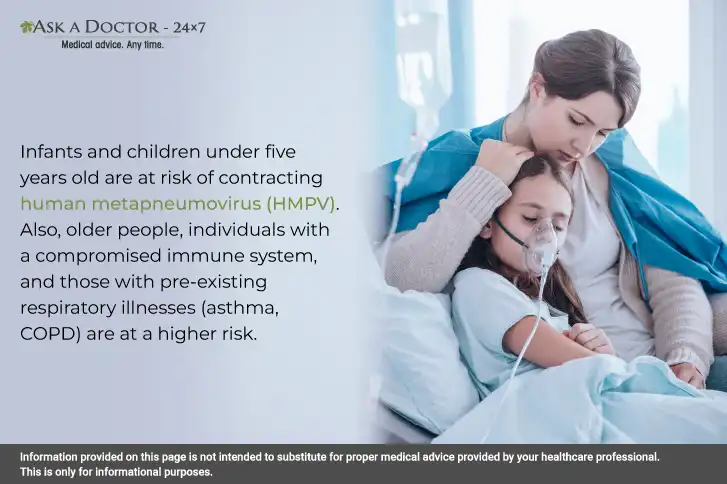What Is HMPV And What Are Its Symptoms?
Human Metapneumovirus (HMPV) is a respiratory virus that can cause symptoms similar to the common cold. The illness can range from mild, cold-like symptoms to severe infections, including pneumonia and bronchiolitis. The infection is more common in the winter and early spring. It is most common in young children (less than 5 years old), the elderly (older than 65 years), and people with weakened immune systems (from conditions like HIV, cancer, or autoimmune disorders). Cough, fever, nasal congestion, and sore throat are the most common symptoms. However, severe cases involve breathing difficulties, wheezing, and shortness of breath.
Now, with fresh cases emerging worldwide, there is a pressing need to learn more about HMPV.
In this blog, we will understand the symptoms, transmission, prevention, and how to protect yourself and your loved ones from the HMPV virus.
Symptoms of HMPV

HMPV often causes upper respiratory infections, but it can sometimes cause lower respiratory infections like pneumonia, asthma flare-ups, or make chronic obstructive pulmonary disease (COPD) worse.
Common symptoms are:
- Cough
- Fever
- Nasal congestion (runny or stuffy nose)
- Sore throat
- Rash
- Tiredness and malaise
- Feeding difficulties and irritability in infants and young children
Severe symptoms, especially in susceptible populations, are:
- Wheezing (a whistling sound during breathing)
- Shortness of breath
- Chest pain
- Difficulty or rapid breathing
- Bronchiolitis (inflammation of the small airways in the lungs)
- Pneumonia (infection of the lung tissue)
- Cyanosis (skin or lips turning blue due to low oxygen levels)
Transmission of HMPV
HMPV is primarily spread through respiratory secretions. It involves direct or intimate contact with contaminated secretions, including saliva, droplets, or large particle aerosols. When an infected person coughs, sneezes, or talks, they may release virus-laden particles into the air, which can then be inhaled by others or settle on surfaces they touch. Infection can result from handling contaminated things or surfaces and then touching the face, particularly the mouth, nose, or eyes. Also, direct contact can transmit the virus through shaking hands, hugging, or other close physical interactions.
Prevention of HMPV
There is currently no vaccine for HMPV, so preventive measures are vital. Similar to preventing other respiratory diseases, HMPV infection can be prevented by the following:
- Wearing a mask in busy or poorly ventilated spaces.
- Increasing ventilation (e.g., by opening a window to allow air to flow) or using an air purifier.
- Washing hands thoroughly and frequently using soap and water or an alcohol-based hand sanitizer.
- Keeping your unwashed hands from touching your eyes, nose, or mouth.
- Maintaining a robust immune system can help prevent illnesses. A healthy diet, consistent exercise, and adequate sleep all contribute to that.
- Avoid shaking hands during flu season and virus outbreaks. Limiting contact with sick people and maintaining a safe distance from others during peak seasons for respiratory illnesses is a must.
- Staying at home when sick to prevent the spread of the virus.
Diagnosis of HMPV
Your healthcare providers usually diagnose HMPV based on your symptoms and health history. However, since there is no specific therapy for HMPV infection and the condition is usually mild, clinicians might not recommend this test to patients who have mild cold or flu-like symptoms.
The most reliable method of diagnosing HMPV is a polymerase chain reaction (PCR) test, which gives precise results within a few hours.
Treatment of HMPV
HMPV is a cold virus, and the majority of people with mild symptoms don't need to consult a doctor. Home-based supportive care can help you recover and resolve the illness on its own. You can manage mild, cold-like symptoms of HMPV at home by doing the following:
- Consuming a lot of liquids to prevent dehydration
- Using over-the-counter (OTC) medications to manage your symptoms, such as cough suppressants, decongestants, and painkillers
Note: Children shouldn't be given pharmaceuticals without first consulting their pediatrician
For moderate to severe symptoms, consult a doctor. Your healthcare providers can monitor your condition and help prevent you from getting sicker.
The treatment involves:
- Oxygen therapy (if breathing is difficult
- IV fluids
- Corticosteroids
Note: Currently, there is no approved antiviral medicine or vaccine for HMPV.
Conclusion
Human metapneumovirus usually causes cold or flu-like symptoms. You will usually recover at home in a few days. However, HMPV can occasionally result in severe lower respiratory tract infection, or it can exacerbate pre-existing respiratory conditions like asthma or COPD. Hence, a person's general health is one of several factors that determine severity during a viral infection, as viruses can alter in intensity as they evolve. Talk to your healthcare provider if you have any concerns about HMPV. Your healthcare providers usually diagnose HMPV based on your symptoms and health history to help prevent its severity.
If you have any questions related to Human Metapneumovirus, ask our physician at Ask a Doctor - 24x7. If a child is infected with HMPV, consult a Specialist for expert opinion.
Recently Answered Questions Related to HMPV
- Is This A Symptom Of COVID-19, as I Have Been Sweating Profusely?
- Suggest Remedies For Persistent Phlegm, Cough, And Loss Of Voice
- What Causes Fatigue, Chest Tightness, And Cough While On Amoxicillin For Chest Infection?
- Why Are The White Cells Very Low Even After Pneumonia subsiding, And Could This Be A Sign If Leukemia?
- Are People Who Have Had COVID now Getting The Comnicron. COVID Variant Infection too?
- Covid Tests Were Positive But PCR Was Negative. Is It Covid?
- Should I Be Concerned About Elevated Bilirubin Levels When I Have Dry Cough Due To COVID-19?
Disclaimer: Information provided on this page is not intended to substitute for proper medical advice provided by your healthcare professional. This is only for informational purposes.
Ask a Specialist
Recent Questions


